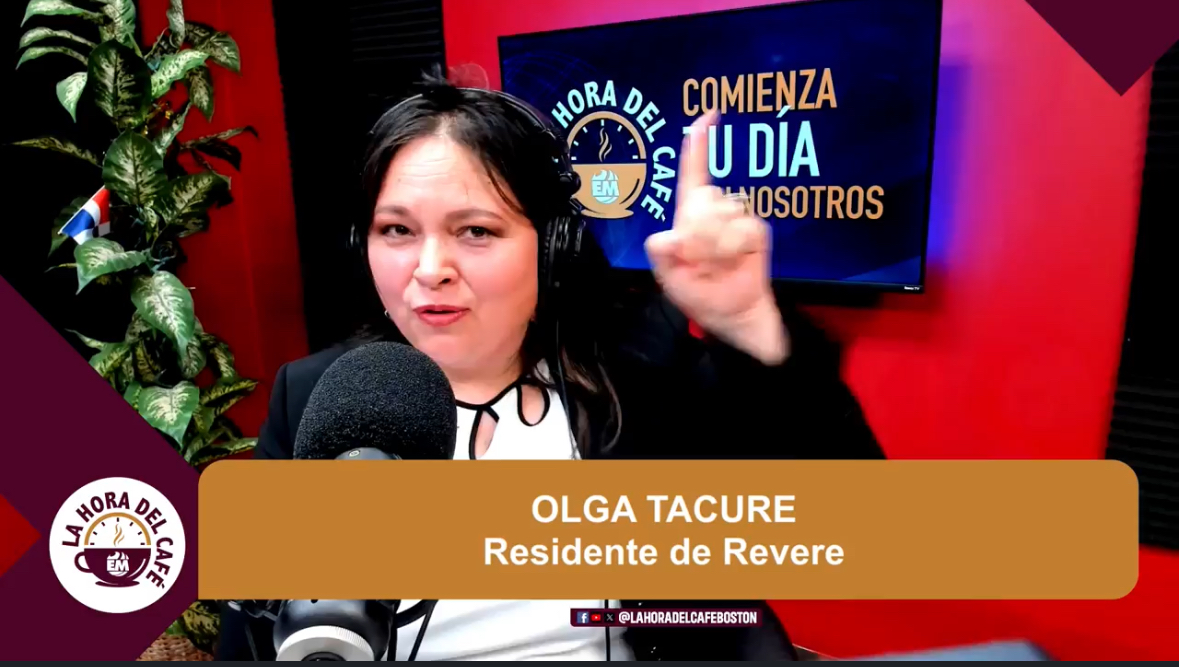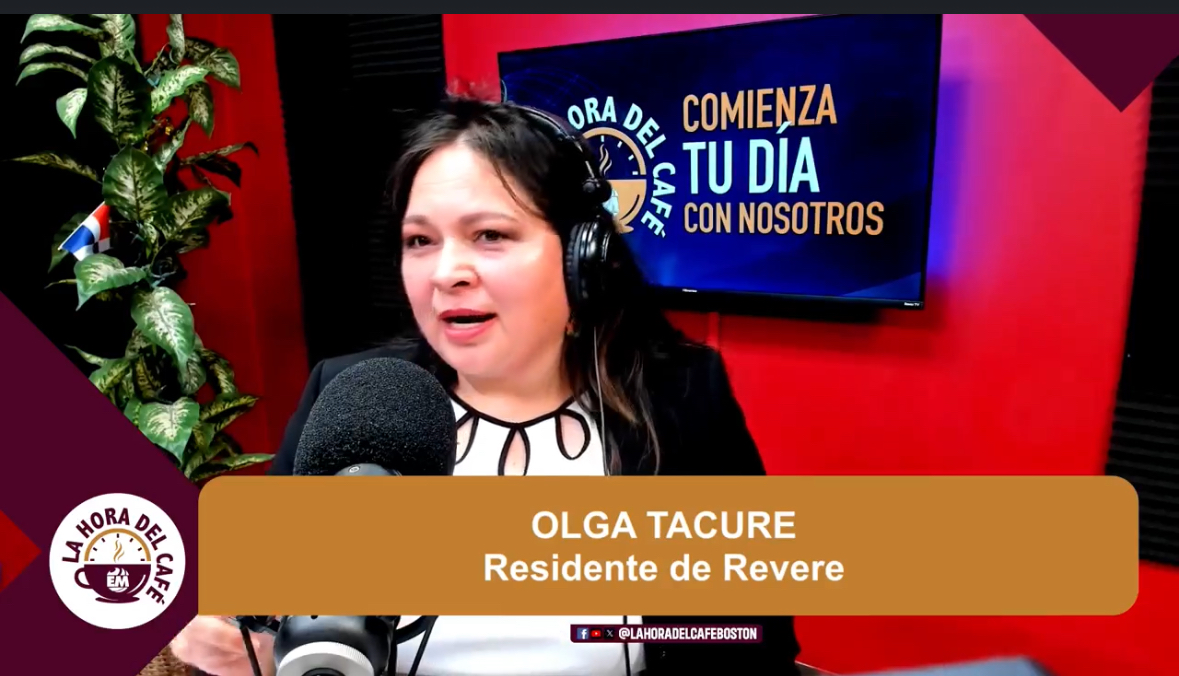By Brian Wright O’Connor
A proposal to site marijuana dispensaries in Revere has touched off a strong backlash from city residents, including large numbers of the sea-side community’s Latino population who fear the health and safety impacts of the move.
Passions around the effort by several Revere City Council members to allow legal sales of recreational pot spilled over during a Wednesday morning segment of “La Hora del Café”, El Mundo Boston’s award-winning livestream broadcast.
“Put on your seatbelts,” advised host Alberto Vasallo III during the opening of the episode, which followed last week’s decision by the council to delay any vote opening the door to the recreational cannabis industry in the North Shore city.
Early on in the segment, Revere resident Viviano Catano, reminded viewers that the city’s residents in 2017 had voted against siting recreational marijuana outlets in the city. “We are about 109 cities and towns that enjoy this protection from the marijuana industry,” said the native of Colombia who has two children in the Revere public schools.
“If we repeal this ban, it will open the floodgates,” she argued. Catano also noted that the proposal centers only on the potential economic benefits but ignores its effect on mental health and substance abuse among youth and beyond.
Revere Councilor at-large Marc Silvestri initiated the repeal of the ban in August. A poorly attended legislative affairs subcommittee hearing advanced the measure in September. The same subcommittee recommended the proposal for passage on Oct. 7 in advance of a full meeting of the 11-member council the same night.
That’s where the fireworks occurred, with a multi-ethnic and near-unanimous anti-marijuana assault on the process that many said left residents, especially Latinos, disempowered and out in the dark.
Olga Tacure, a native of Peru, said on the show that the outpouring of opposition once the stakes were known, including a petition signed by over 350 Revere residents objecting to recreational pot sales, demonstrated how strongly people felt. None of the dozens in attendance spoke up in favor of cannabis dispensaries.
Tacure also noted that in Lawrence, which is a predominantly Latino gateway city, the message was clear: keep marijuana dispensaries out.
“I haven’t found one Latino family in Revere that is in favor of this proposal and these elected officials need to remember that they represent us and that they cannot act like they just know better. That’s not their job. Their job is to listen to the community and act on what we want, added Tacure.
Speaking as a private citizen and not in her capacity as a member of the Board of Health, Catano warned of the unknown long-term impacts of marijuana on the developing brains of teenagers in a society where smoking pot is often glorified in music and movies – and even sports, where the recent Paris Olympics coverage featured the blunt-loving rapper Snoop Dogg floating his way through the City of Lights courtesy of NBC.
“Commercialization of cannabis, including marijuana, concentrates and edibles, may affect adolescents’ use directly by increasing availability or indirectly by promoting beliefs that its use is safe and normative,” she said.
“But young people struggling with anxiety and depression are being deceived into thinking marijuana is an all-natural product that will help them manage their stress. Their brain is still developing, and they are more likely to develop an addiction.”
Ward 4 City Councilor Paul Argenzio, who was invited on the show to help clarify the political process taking place, pointed out that consuming marijuana is legal in Revere and that an important overriding issue is that the oceanside city is losing money to surrounding towns that host pot shops.

“When our residents go to other cities and towns, they benefit from our money. We want to keep Revere money in Revere so we can see the benefit,” he said.
Argenzio estimated that two or three dispensaries would yield somewhere between $200,000 and $300,000 in annual tax revenues out of city budget totaling $274 million in 2024 – a tiny 1/10 of 1% of municipal spending.
The councilor conceded that more consideration was needed to give local residents more time to weigh in on the proposal.
While the council tabled the repeal proposal, it is moving ahead on other fronts. Argenzio said the next step in the process would be a zoning committee hearing on Monday, Oct. 21, at 5 p.m., at Revere City Hall to consider restrictions on the number of stores, their placement, and signage.
The legislative affairs subcommittee and full council will then consider the repeal again at the Oct. 28 council meeting, he said.
Between now and then, Tacure and Catano said they would continue to rally community opposition to placing dispensaries in the city.
Their concerns were underscored by comments on La Hora del Café from Samantha Green-Atchley, assistant vice president of clinical services at North Suffolk Community Services, the primary public health non-profit operating in the catchment area of East Boston, Chelsea and Revere.
While marijuana is often prescribed for medicinal purposes to patients with HIV or AIDS, Crohn’s Disease, Parkinson’s Disease or ALS, “there is not a ton of evidence showing the medicinal benefit for these conditions, said Green-Atchley, who strongly asserted that marijuana is addictive.
Revere, a city of over 60,000, has seen its Latino population increase four-fold since 2000, rising to close to 40% of city residents.
Catano also highlighted that about 48 retail outlets in Revere selling tobacco products, 23 liquor stores and 84 total liquor licenses – in a city that covers a total of 10 square miles, only six of them on land.
“Why does Revere have more tobacco retail than wealthier communities with fewer minorities?” asked Catano. “The tobacco industry intentionally did this for years. They deliberately targeted low-income communities of color,” she said, warning that the cannabis industry, like the tobacco giants, constantly need new customers “to addict the next generation to maintain their revenue.”
And with not enough known about the long-term consequences of marijuana use, “we don’t want the youth of today to be the social experiment of tomorrow,” discovering, too late – like the smokers who started lighting up in the 50s and 60s – that their habit was killing them.
Vasallo pledged that El Mundo Boston and La Hora del Cafe, as a commitment to public service, would continue to follow the issue and report on the votes around recreational cannabis dispensaries in Revere, listing the names of every councilor and how they voted.
“We’re going to be taking notes,” said Tacure. “We’re going to remember who voted with the families of Revere and who voted with the multi-billion dollar cannabis industry.”










